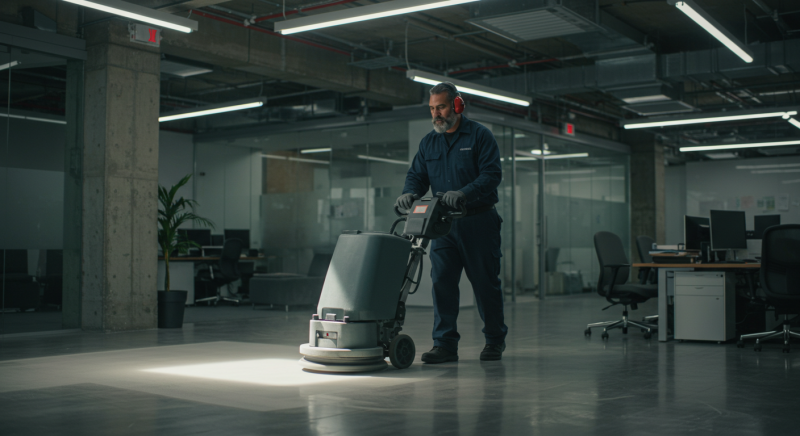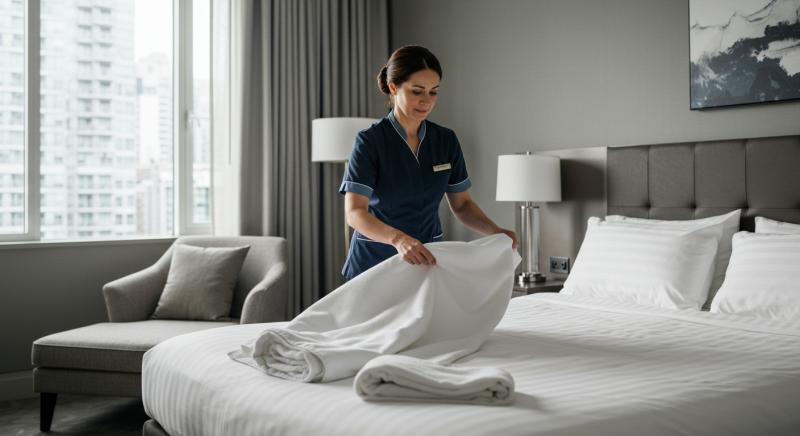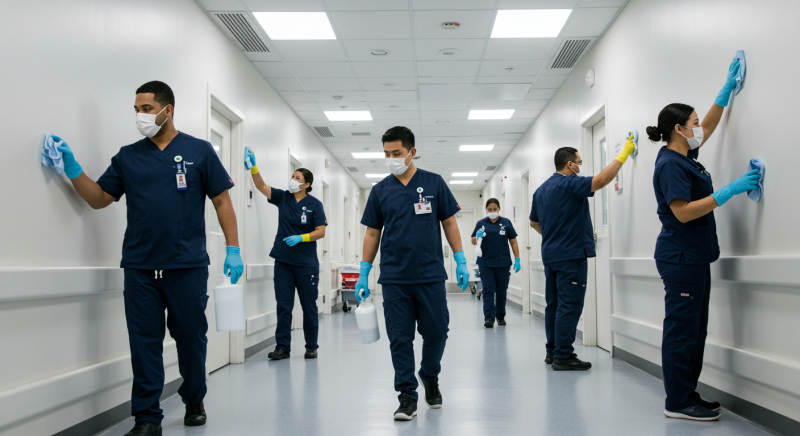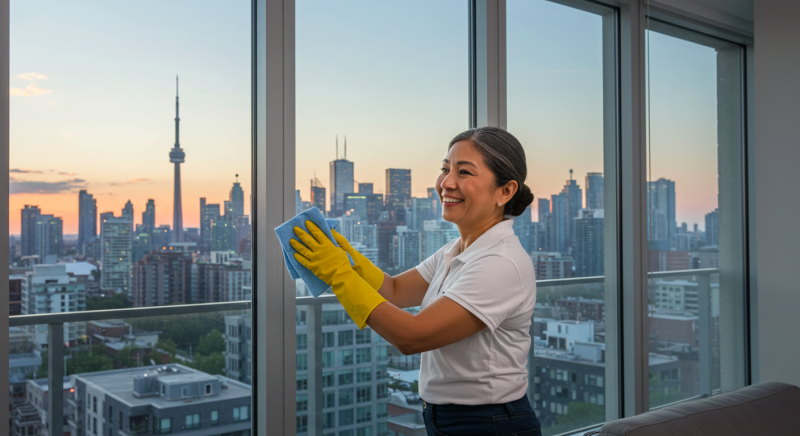Are you planning a move to Canada and wondering how to kickstart your career in the cleaning industry? Canada’s thriving cleaning sector offers diverse opportunities for newcomers, combining steady demand with competitive pay. This guide highlights 15 cleaning jobs in Canada for people moving to Canada, along with qualifications, salary expectations, and insider tips to help you succeed.
Key Takeaways:
- Canada’s cleaning industry is growing rapidly, with over 400,000 workers employed in janitorial and maintenance roles.
- Newcomers can access entry-level roles without extensive experience, though certifications improve employability.
- Salaries range from 17to35 per hour, depending on specialization and location.
- Employers increasingly prioritize eco-friendly cleaning practices and bilingual skills.

15 Cleaning Jobs in Canada for People Moving to Canada
1. Residential Cleaner
Residential cleaners maintain private homes, apartments, and condos. Tasks include vacuuming, dusting, and sanitizing kitchens/bathrooms. Many newcomers start here due to low entry barriers.
Requirements: Physical stamina, attention to detail.
Qualifications: On-the-job training; certifications in chemical safety (e.g., WHMIS) preferred.
Salary:25/hour.
2. Commercial Office Cleaner
Commercial cleaners service corporate offices, ensuring workspaces meet hygiene standards. Evening shifts are common, offering flexibility.
Requirements: Reliability, time management.
Qualifications: Experience with industrial equipment (floor buffers, carpet cleaners).
Salary: 28/hour.
3. Hospital/Healthcare Cleaner
This role demands strict adherence to sanitation protocols to prevent infections. Hospitals in Ontario and Alberta report high demand.
Requirements: Knowledge of biohazard disposal.
Qualifications: Certifications in infection control (e.g., IPAC).
Salary: 30/hour.
4. Hotel Housekeeper
Hotels in tourist hubs like Vancouver and Niagara Falls hire year-round. Duties include room turnover, laundry, and restocking amenities.
Requirements: Customer service skills.
Qualifications: Hospitality training is a plus.
Salary: 24/hour + tips.
5. Carpet Cleaner
Carpet cleaners specialize in deep-cleaning residential and commercial carpets using steam cleaners and stain-removal techniques. This role is ideal for newcomers to Canada, particularly in cities like Toronto and Calgary, where high rental turnover drives demand.
Requirements: Familiarity with carpet materials and eco-friendly cleaning solutions.
Qualifications: Certification from the Institute of Inspection, Cleaning and Restoration (IICRC) enhances job prospects.
Salary: 27/hour.
6. Industrial Cleaner
Industrial cleaners maintain factories, warehouses, and manufacturing plants, often handling heavy machinery cleanup. Alberta’s oil and gas sector frequently hires for these roles.
Requirements: Ability to work in noisy environments and lift heavy equipment.
Qualifications: WHMIS certification and forklift operation training are assets.
Salary: 30/hour.
7. School/University Cleaner
Educational institutions require cleaners to sanitize classrooms, labs, and dormitories. Seasonal peaks align with academic calendars, offering stable hours.
Requirements: Background checks and teamwork skills.
Qualifications: Experience in custodial work preferred.
Salary: 26/hour.
8. Airport Cleaner
Airport cleaners ensure terminals and aircraft meet strict hygiene standards. Major hubs like Toronto Pearson and Vancouver International Airport hire year-round.
Requirements: Flexibility for overnight shifts and fast-paced environments.
Qualifications: Security clearance and customer service training.
Salary: 28/hour.
9. Restaurant Cleaner
Restaurant cleaners sanitize kitchens, dining areas, and equipment. This role suits newcomers seeking part-time work in cities like Montreal and Ottawa.
Requirements: Knowledge of food safety protocols.
Qualifications: Food Handler Certification (e.g., Canadian Institute of Food Safety).
Salary: 23/hour + shared tips.
10. Window Cleaner
Window cleaners service high-rise buildings and residential homes, often requiring rope access or scaffolding skills. Vancouver’s luxury condos and Toronto’s business districts offer steady opportunities.
Requirements: Comfort with heights and attention to detail.
Qualifications: Industrial rope access training (IRATA) for high-rise work.
Salary: 22–35/hour.
11. Move-In/Move-Out Cleaner
Specializing in pre- and post-rental cleaning, this role is in demand in cities with high real estate activity like Halifax and Edmonton.
Requirements: Efficiency in deep-cleaning appliances and grout.
Qualifications: None required, but time management is critical.
Salary: 18–27/hour.
12. Green Cleaning Specialist
Green cleaners use eco-friendly products and methods, appealing to environmentally conscious clients. Certifications like Green Seal are valuable in cities like Victoria and Kelowna.
Requirements: Knowledge of sustainable practices.
Qualifications: Green cleaning certification.
Salary: 20–32/hour.
13. Janitorial Supervisor
Supervisors manage cleaning teams in large facilities. Leadership experience is key, with roles common in Ontario’s healthcare and education sectors.
Requirements: Leadership skills and budget management.
Qualifications: Diploma in facility management or related field.
Salary: 25–35/hour.
14. Disaster Restoration Cleaner
These professionals handle post-flood, fire, or mold cleanup. Training in hazardous material handling is essential, with demand spiking in regions prone to wildfires like British Columbia.
Requirements: Physical stamina and crisis management skills.
Qualifications: IICRC certification in water/fire damage restoration.
Salary: 23–34/hour.
15. Cruise Ship Cleaner
Cruise lines like those docking in Vancouver and Quebec hire cleaners for cabins and common areas. Contracts often include lodging and meals.
Requirements: Adaptability to live aboard ships for months.
Qualifications: Hospitality experience and first-aid training.
Salary: 21–29/hour + tips.
Key Industry Insights
- Certification Impact: Workers with WHMIS or IICRC certifications earn 15–20% more hourly (Job Bank Canada).
- Regional Demand: Alberta and Ontario account for 45% of Canada’s cleaning jobs, per Statistics Canada.
Qualifications and Certifications for Cleaning Jobs in Canada for People Moving to Canada
Securing one of the cleaning jobs in Canada for people moving to Canada often begins with understanding the qualifications and certifications that employers prioritize. While many roles require minimal formal education, targeted training and credentials can significantly enhance your employability and earning potential. Below, we break down the key certifications, language requirements, and soft skills that align with these opportunities, ensuring newcomers are well-prepared to enter Canada’s dynamic cleaning sector.
Core Certifications for High-Demand Roles
For the cleaning jobs in Canada for people moving to Canada, certifications serve as a gateway to specialized roles and higher wages. Here’s a closer look at the most valuable credentials:
- WHMIS (Workplace Hazardous Materials Information System): Mandatory for roles involving chemical handling, such as hospital cleaners or industrial cleaners, this certification ensures safety compliance. Workers with WHMIS training earn up to 15% more hourly, according to Job Bank Canada.
- Green Seal Certification: Critical for eco-friendly cleaning specialists, this credential validates expertise in sustainable practices, a growing preference among clients in cities like Vancouver and Toronto.
- IICRC (Institute of Inspection, Cleaning and Restoration Certification): Essential for carpet cleaners and disaster restoration professionals, this globally recognized certification covers stain removal, mold remediation, and water damage repair.
- Food Handler Certification: Required for restaurant cleaners, this ensures adherence to Canada’s stringent food safety laws. The Canadian Institute of Food Safety offers courses in multiple languages, ideal for newcomers.
- First Aid/CPR: Valued across all sectors—especially healthcare and cruise ship cleaning—this certification demonstrates preparedness for emergencies.
Language Proficiency and Regional Requirements
Canada’s bilingual workforce means proficiency in English or French is vital for client-facing roles like hotel housekeepers or janitorial supervisors. In provinces like Quebec, bilingual candidates are often prioritized. For non-client roles (e.g., industrial cleaning), basic conversational skills may suffice. Newcomers can access free language classes through government programs like Language Instruction for Newcomers to Canada (LINC), which bridges communication gaps and boosts employability for the cleaning jobs in Canada for people moving to Canada.
Provincial Variations and Skill Demand
Certification requirements often vary by region. For example:
- Alberta: Industrial cleaners benefit from forklift operation training due to the province’s oil and gas sector dominance.
- Ontario: Hospital cleaners require IPAC (Infection Prevention and Control) training, reflecting the province’s large healthcare network.
- British Columbia: Window cleaners with IRATA (Industrial Rope Access Trade Association) certification command premium wages for high-rise projects in Vancouver.
Soft Skills That Complement Certifications
Beyond technical training, employers seek reliability, physical stamina, and attention to detail—traits critical for roles like move-in/move-out cleaners or disaster restoration specialists. Time management is prized in fast-paced environments like airports, while customer service skills elevate hotel housekeepers and residential cleaners.
How Newcomers Can Access Training
Many certifications are affordable and accessible. For instance:
- Online Courses: Platforms like Coursera offer WHMIS and safety training.
- Community Colleges: Institutions like Seneca College (Ontario) and Bow Valley College (Alberta) provide short-term cleaning certifications.
- Employer-Sponsored Programs: Companies like ServiceMaster Canada often fund training for promising candidates.
By prioritizing these qualifications, newcomers can confidently apply for the 15 cleaning jobs in Canada for people moving to Canada, positioning themselves as competitive, safety-conscious candidates. Whether aiming for hospital sanitation in Toronto or eco-friendly home cleaning in Victoria, certifications unlock doors to stable, well-paying roles in this thriving industry.

Salary Insights for Cleaning Jobs in Canada for People Moving to Canada
Canada’s cleaning industry offers competitive wages, with salaries influenced by factors like location, experience, certifications, and specialization. Below, we break down earnings across roles and regions, supported by statistical data and trends to help newcomers gauge their potential income.
Average Hourly and Annual Earnings
The average hourly wage for cleaners in Canada ranges from 14to35, depending on the role and sector. Entry-level positions typically start at 14–17/hour, while specialized roles (e.g., disaster restoration or high-rise window cleaning) can reach 25–35/hour . Annually, full-time cleaners earn between 30,000and53,000, with supervisors and certified professionals at the higher end.
Key Trends:
- Hospital/Healthcare Cleaners: Earn 20–30/hour due to stringent sanitation requirements.
- Industrial Cleaners: In Alberta’s oil sector, wages average 20–30/hour.
- Green Cleaning Specialists: Command 20–32/hour as eco-friendly practices gain traction.
- Window Cleaners: High-rise specialists in cities like Vancouver and Toronto earn 22–35/hour with IRATA certification.
Regional Variations
Salaries vary significantly by province, reflecting local demand and cost of living:
- Ontario: 18–28/hour (urban centers like Toronto pay premiums for commercial and hospital roles).
- British Columbia: 20–35/hour (luxury residential and eco-friendly niches in Vancouver).
- Alberta: 19–30/hour (industrial facilities and oil sector demand).
- Quebec: 14–19/hour (bilingual skills often required).
Impact of Certifications and Experience
Certifications boost earning potential by 15–20%:
- WHMIS (Hazardous Materials): Adds 1–3/hour for roles in healthcare or industrial settings.
- IICRC (Restoration): Disaster restoration cleaners earn 23–34/hour with this certification.
- Green Seal: Eco-friendly specialists see wages up to $32/hour in environmentally conscious markets.
Experience also plays a critical role:
- Entry-level cleaners start at 14–17/hour, but mid-career professionals (5+ years) earn 20–25/hour.
- Supervisors or managers (e.g., janitorial supervisors) can earn 25–35/hour.
Highest-Paying Roles
- Disaster Restoration Cleaner: 23–34/hour (requires hazardous material training).
- Window Cleaner (High-Rise): 22–35/hour (IRATA certification mandatory).
- Janitorial Supervisor: 25–35/hour (leadership roles in large facilities).
- Cruise Ship Cleaner: 21–29/hour + tips (includes lodging and meals).
Industry Growth and Future Outlook
Canada’s cleaning sector is projected to grow by 12% by 2030, driven by healthcare, hospitality, and green cleaning demand 10. Urban centers like Toronto and Vancouver are hotspots for high-paying opportunities, while provinces like Alberta and Ontario account for 45% of national cleaning jobs.
Additional Benefits
Many employers offer perks beyond base pay:
- Overtime Pay: Common in industrial and healthcare roles, adding 1.5x hourly rates.
- Tips: Hotel housekeepers and residential cleaners earn 2–5/hour extra in gratuities.
- Health Insurance: Full-time roles in corporate or healthcare settings often include benefits
How to Secure One of the Cleaning Jobs in Canada for People Moving to Canada
Securing one of the cleaning jobs in Canada for people moving to Canada involves a blend of preparation, networking, and understanding local hiring practices. Below, we outline actionable steps tailored to newcomers, ensuring you stand out in Canada’s competitive cleaning industry while leveraging the keyword naturally throughout the guide.
1. Research High-Demand Regions and Roles
Canada’s cleaning sector varies by province and city. For example, industrial cleaners are in high demand in Alberta’s oil regions, while eco-friendly specialists thrive in British Columbia’s urban centers. Use tools like Job Bank Canada to identify which of the cleaning jobs in Canada for people moving to Canada align with local opportunities. Focus on regions with labor shortages, such as Ontario’s healthcare sector or Quebec’s hospitality industry, to increase your chances of quick employment.
2. Obtain Relevant Certifications
Employers prioritize candidates with certifications that match the cleaning jobs in Canada for people moving to Canada. For instance:
- WHMIS certification is essential for roles involving chemical use (e.g., hospital or industrial cleaning).
- Green Seal credentials appeal to eco-conscious employers in cities like Vancouver.
- Food Handler Certification is mandatory for restaurant cleaners.
Many certifications can be earned online or through affordable workshops. Platforms like Coursera offer safety training, while community colleges like Toronto’s Seneca College provide hands-on custodial programs.
3. Leverage Newcomer-Focused Job Agencies
Recruitment agencies like Molly Maid, ServiceMaster, and Jan-Pro Canada specialize in placing newcomers in the cleaning jobs in Canada for people moving to Canada. These agencies often provide:
- Free training programs to familiarize you with Canadian cleaning standards.
- Flexible shifts tailored to your schedule.
- Direct hiring pathways for roles like residential or commercial cleaners.
Register with multiple agencies to maximize exposure. For example, Maid4Condos in Toronto frequently hires bilingual candidates for luxury condo cleaning roles.
4. Build a Canadian-Style Resume
Canadian employers value resumes that highlight reliability, physical stamina, and safety awareness—key traits for the cleaning jobs in Canada for people moving to Canada. Structure your resume to include:
- Certifications (e.g., WHMIS, First Aid) in a prominent section.
- International experience translated into Canadian equivalents (e.g., “5 years of hotel housekeeping in Mumbai” becomes “Experience in high-volume hospitality cleaning”).
- Volunteer work, such as community cleanups, to demonstrate initiative.
Use free templates from Canva or government portals like Employment Ontario to ensure your resume meets local standards.
5. Network with Local Communities
Connecting with other newcomers and industry professionals is critical. Join Facebook groups like “Newcomers to Canada Jobs” or attend events hosted by organizations like ACCES Employment. These platforms often share unadvertised opportunities for the cleaning jobs in Canada for people moving to Canada. For example, Toronto’s CleanStart Initiative partners with newcomers to provide mentorship and job placements in commercial cleaning.
6. Prepare for Interviews with Cultural Insight
Canadian employers prioritize punctuality, clear communication, and teamwork. Practice answering common questions like:
- “How do you handle repetitive tasks?”
- “Describe a time you resolved a client complaint.”
Highlight your adaptability to Canadian workplace culture, such as familiarity with diversity policies or eco-friendly practices. For bilingual roles in Quebec, practice interviews in French using resources like Bonjour Québec.
7. Explore Government Programs for Newcomers
Programs like Canada’s Language Instruction for Newcomers (LINC) offer free language classes, while Settlement Agencies provide job-search support. For example, the YMCA’s Newcomer Services in Vancouver connects immigrants with employers seeking candidates for the cleaning jobs in Canada for people moving to Canada.
8. Start with Part-Time or Contract Roles
Many newcomers secure part-time cleaning gigs through platforms like TaskRabbit or Kijiji to gain Canadian experience. These roles often lead to full-time positions, especially in high-turnover sectors like hotel housekeeping or move-in/move-out cleaning.
9. Stay Updated on Industry Trends
Canada’s cleaning industry is shifting toward green practices and automation. Follow blogs like CleanLink or attend webinars to learn about emerging tools (e.g., electrostatic sprayers) or certifications (e.g., LEED accreditation) that align with the cleaning jobs in Canada for people moving to Canada.
10. Follow Up Persistently
After applying, send a polite follow-up email within a week. For example:
“Dear [Hiring Manager], I recently applied for the [Role] position and wanted to reiterate my enthusiasm. My certification in [XYZ] and experience in [ABC] align well with your needs. I’d welcome the chance to discuss how I can contribute to your team.”
This proactive approach demonstrates professionalism and can differentiate you in competitive markets like Toronto or Calgary.
Key Takeaway:
By combining certifications, strategic networking, and cultural adaptability, newcomers can efficiently secure one of the cleaning jobs in Canada for people moving to Canada. From industrial cleaning in Alberta to eco-friendly roles in B.C., these steps ensure you’re prepared to thrive in Canada’s dynamic cleaning sector.
Conclusion
Canada’s cleaning sector offers newcomers a reliable pathway to employment, with roles spanning homes, hospitals, and corporate spaces. By obtaining relevant certifications and leveraging local networks, you can secure a stable income while integrating into Canadian society.

FAQ
Q: Do I need to speak English or French fluently to secure one of the 15 cleaning jobs in Canada for people moving to Canada?
A: Language requirements vary by role and region. For client-facing positions like hotel housekeeping or residential cleaning, basic proficiency in English or French is essential to communicate with clients or supervisors. In bilingual provinces like Quebec, French fluency is often prioritized. However, for roles such as industrial or overnight cleaning, conversational skills may suffice. Canada offers free language programs like LINC to help newcomers improve their language skills, ensuring they can confidently pursue the cleaning jobs in Canada for people moving to Canada.
Q: How can I get my foreign certifications recognized for cleaning jobs in Canada?
A: Many certifications, such as safety training or hospitality courses, are transferable if they align with Canadian standards. For specialized roles like disaster restoration or carpet cleaning, consider obtaining Canadian-specific credentials like IICRC certification through local institutions. Organizations like World Education Services (WES) can help assess international qualifications. Highlighting your global experience alongside Canadian certifications will strengthen your application for the cleaning jobs in Canada for people moving to Canada.
Q: Can I apply for cleaning jobs before arriving in Canada?
A: Yes! Many Canadian employers, including agencies like Molly Maid or ServiceMaster, accept online applications. Networking platforms like LinkedIn or Canadian job boards like Indeed Canada allow you to connect with employers early. Mention your relocation timeline in your resume, and consider virtual interviews to secure roles such as cruise ship cleaner or industrial cleaner before arrival.
Q: What are the typical working hours for cleaning jobs in Canada?
A: Hours vary across the cleaning jobs in Canada for people moving to Canada. Residential and hotel cleaners often work daytime shifts, while commercial office or airport cleaners may have evening or overnight schedules. Part-time roles are common in restaurants or move-in/move-out cleaning, offering flexibility. Full-time positions in hospitals or schools typically provide stable 40-hour weeks, with overtime pay in provinces like Alberta.
Q: Are there opportunities for career growth in Canada’s cleaning industry?
A: Absolutely. Many newcomers start in entry-level roles and advance to supervisory positions or specialize in high-demand areas like green cleaning or disaster restoration. For example, obtaining a facility management diploma can lead to roles as a janitorial supervisor, with salaries up to $35/hour. Employers like BGIS or Aramark often promote internally, making the cleaning jobs in Canada for people moving to Canada a pathway to long-term career success.
Q: Do I need a work permit to work in cleaning jobs as a newcomer?
A: Yes, a valid work permit is required. Temporary residents can apply through programs like the Temporary Foreign Worker Program (TFWP), while permanent residents have full work rights. Always verify your eligibility on the IRCC website before applying. Some roles, like cruise ship cleaners, may require additional visas depending on the employer’s location.
Q: How can I prove my international cleaning experience to Canadian employers?
A: Provide reference letters from previous employers detailing your responsibilities, such as “managed deep-cleaning for 50+ hotel rooms monthly.” Translate documents into English or French, and include volunteer work (e.g., community center cleaning) to demonstrate adaptability. Employers value diverse experience, especially for roles like hospital or industrial cleaning within the cleaning jobs in Canada for people moving to Canada.
Q: Are cleaning jobs seasonal or available year-round?
A: Most of the cleaning jobs in Canada for people moving to Canada are year-round, particularly in healthcare, schools, and offices. Seasonal peaks occur in tourism-heavy areas (e.g., hotel housekeeping in Banff during winter) or move-in/move-out cleaning during summer rental cycles. Platforms like Kijiji often list short-term gigs for supplementary income.
Q: Can cleaning jobs help me qualify for permanent residency (PR)?
A: Yes! Many cleaning roles fall under Canada’s National Occupational Classification (NOC) system, making them eligible for PR pathways like the Provincial Nominee Program (PNP). For example, Alberta’s Accelerated Tech Pathway prioritizes skilled trades, including industrial cleaning. Gaining Canadian experience through the cleaning jobs in Canada for people moving to Canada strengthens your PR application.
Q: What safety standards should I know for cleaning jobs in Canada?
A: Familiarize yourself with the Workplace Hazardous Materials Information System (WHMIS) for chemical safety and provincial Occupational Health and Safety (OHS) regulations. For roles like hospital cleaning, infection control protocols (IPAC) are critical. Employers provide training, but pre-arrival courses (e.g., CCOHS) can give you a competitive edge.
READ MORE
